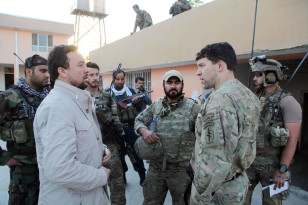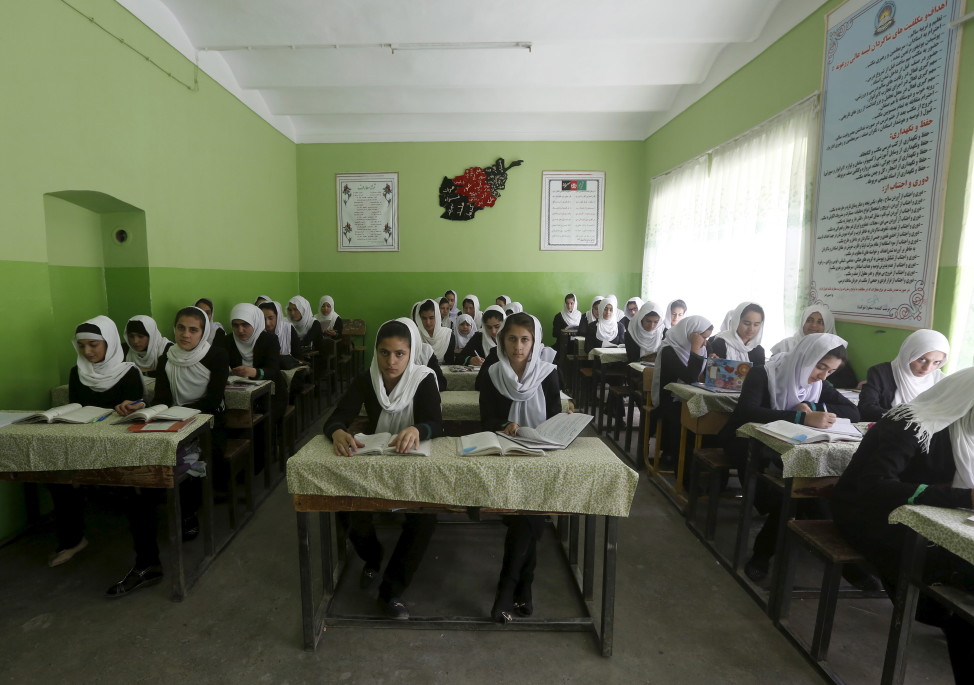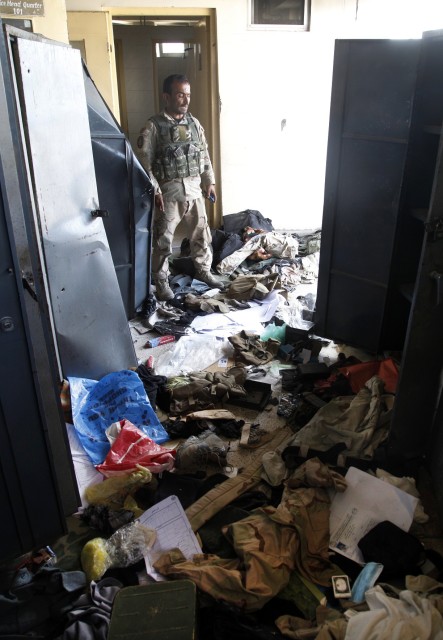Afghan Forces on the Run
The Editorial Board – The New York Times
Nearly a year after the official end of NATO’s combat mission in Afghanistan, this military failure confirms the worst fears about the weaknesses of the Afghan forces. Some 7,000 government forces and militiamen were overcome by far fewer Taliban in Kunduz.

Kunduz chief of police, Mohammad Qasim Jangalbagh, left, talks to U.S. and Afghan special forces in Kunduz city, north of Kabul, Afghanistan on Oct. 1, 2015. (AP)
For the United States to provide emergency assistance in the fight for Kunduz is one thing. But it must not be drawn back into a war that cannot be ended except by the Afghan government itself. Yet there are signs this is happening, as the security situation has deteriorated. Gen. John Campbell, who commands NATO and American forces in Afghanistan, now exerts so much influence at the top levels of the Afghan government that some Afghans refer to him as the country’s de facto defense minister….
While that and other challenges may be beyond the government’s control, the reality remains that the Afghan security forces have a very high attrition rate, have suffered a 50 percent increase in casualties in the first six months of this year compared with last year and have been spread thin as the Taliban opened new fronts in all parts of the country.
How Afghanistan Can Succeed
Hamdullah Mohib – CNN
Afghanistan today is a functioning democracy. It has the freest media in the region, with a thriving private media sector. Our people vote for their leaders and power changes hands through ballots, not bullets. Civil society organizations, both domestic and international, are free to organize and we welcome their partnership in helping our country overcome the legacy of years of war….
Afghanistan has changed. Today, women are present alongside men in government, universities, and the workforce — the highest numbers in the country’s history, and the number is growing. Eleven million students are in school, 40 percent of them girls. Over 260,000 Afghan youths are studying in one of the 135 private and public universities.

Afghan girl students attend a class at Zarghona high school in Kabul, Afghanistan, Aug. 15, 2015. (Reuters)
It would be incredulous to pretend that Afghanistan’s troubled past is now fully behind us. Just this past Sunday, the Taliban took local civilians as human shields to seize large swathes of Kunduz province in the north of Afghanistan. Afghan forces have mounted a robust counteroffensive to clear the area of terrorist elements and to protect our civilians, but the ongoing violence there is a reminder of the security challenges we still face.
The Second Kick of a Mule in Afghanistan
Andrew Gawthorpe – The Boston Globe
The fall of Kunduz illustrates the dynamics at play. The Taliban have been slowly consolidating their control over the province for years. Their task has been made easier by a corrupt and inefficient local government and abusive security forces that have driven segments of the province’s Pashtun population into the arms of the Taliban.
The United States may decide to bolster Kabul further with more troops or resources, but Washington can only delay the inevitable day when Afghanistan must face its demons alone.
Those demons were on full display in the fall of Kunduz. The verdict on a decade and a half of American war now rests largely in the hands of Washington’s imperfect allies and the choices they make. From Kabul to Baghdad, the results so far are not encouraging.

A member of the Afghan security forces stands in a government office, destroyed by Taliban fighters in Kunduz city, Afghanistan on Oct. 1, 2015. (AP)
Putin Dares, Obama Dithers
The Editors – The Economist
Both Kunduz and Russia’s bombing are symptoms of the same phenomenon: the vacuum created by Barack Obama’s attempt to stand back from the wars of the Muslim world. America’s president told the UN General Assembly this week that his country had learned it “cannot by itself impose stability on a foreign land”; others, Iran and Russia included, should help in Syria. Mr Obama is not entirely wrong.
But his proposition hides many dangers: that America throws up its hands; that regional powers, sensing American disengagement, will be sucked into a free-for-all; and that Russia’s intervention will make a bloody war bloodier still. Unless Mr Obama changes course, expect more deaths, refugees and extremism.
Having seen the mess that George W. Bush made of his “war on terror”, especially in Iraq, Mr Obama is understandably wary. American intervention can indeed make a bad situation worse, as odious leaders are replaced by chaos and endless war saps America’s strength and standing. But America’s absence can make things even more grim. At some point, extremism will fester and force the superpower to intervene anyway.

